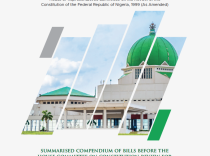The House of Representatives considered the Report by its Committee on Police Affairs on the Police Act (Repeal and Re-enactment) Bill, 2020 on 19 May 2020. The Report had earlier been presented to the House by the Chairman of the House Committee on Police Affairs, Hon. Bello Usman Kumo (Gombe: APC) on 12 May 2020. The Police Bill, 2020 sponsored by Hon. Yusuf Adamu Gagdi (Plateau: APC) was introduced on 13 February 2020 and had passed second reading on 26 February 2020.
The Police Bill, 2020 seeks to repeal and re-enact the Police Act, which was originally enacted in 1943. The objective of the bill is to provide for a more efficient and effective police force that is based on the principles of accountability and transparency; and protection of human rights and fundamental freedoms. In addition, the bill seeks to provide for a Police Force that is more responsive to the needs of the general public and has entrenched in its operations the values of fairness, justice and equity and empower the Police Force to effectively prevent crimes without threatening the liberty and privacy of persons in Nigeria; to name a few.
In commencing the consideration of the report, the Chairman of the House Committee on Police Affairs, Hon. Bello Kumo (Gombe: APC) gave a brief synopsis of what the bill seeks to achieve. He stated that the bill aims to respond to the general complaint that the Police is ineffective and unfriendly; lacking in accountability and transparency with no involvement of the community. Some key areas of the bill he highlighted include remuneration of police officers, requirement for police officers’ observation of human rights as contained in the Constitution and the setting up of a special constabulary. In his submissions, he informed his fellow members that a 10-man sub-committee was constituted to look into the bill and there was wide consultation, which included a public hearing that took in submissions that fed into the report.
At the consideration of the Bill, most of its provisions were adopted, however a couple of issues proved to be contentious. For instance, there was a debate on a provision in the bill that provides for a 4 year tenure for the Inspector General of Police (IGP) and another provision that provides that Police Officers should serve for 35 years or until 60 years of age, whichever is earlier (in line with Public Service Rules). It was argued that stipulating a 4 year tenure for the IGP and subjecting same to Public Service Rules could create a disincentive on appointment of experienced officers who have the capacity to head the Force but are close to retirement and will be caught by the service rule on grounds of age. Conversely, this would create an advantage for younger officers still having more years of service over those nearing retirement. Another argument was that a 4 year tenure for the IGP could extend his/her years of service beyond what is obtainable in the public service, which will be disadvantageous to other serving officers and that therefore, every officer (including the IGP) who reaches the prescribed retirement age should be made to retire. Following an extensive debate on this issue, it was resolved that the provision on 4 year tenure for the IGP should be made subject to the requirement on service for 35 years or 60 years of age, whichever is earlier.
The House also voted to empower the Nigeria Police Force (NPF) to recruit police constables as against the current practice of the Police Service Commission (PSC) performing this duty as stipulated in paragraph 30 of the Third Schedule of the 1999 Constitution which states that “the Commission shall have power to appoint persons to offices (other than office of the Inspector- General of Police) in the Nigeria Police Force” and also section 6(1) of the Police Service Commission Act 2001 which reiterates this power by stating that “the Commission shall be responsible for the appointment and promotion of persons
to offices (other than the office of the Inspector-General of Police) in the Nigeria Police Force”.
The NPF and PSC recently got embroiled in a conflict over this issue. Following the recruitment of 10,000 constables in late 2019 by the Inspector General of Police, the PSC sued the NPF arguing that the recruitment was a usurpation of its powers and functions and that neither the NPF or the IGP is authorised by law to play any role in the appointment, promotion, dismissal or exercise of disciplinary measures over persons holding or aspiring to hold offices in the Nigeria Police Force. Conversely, the NPF argued that there is a difference between “recruitment” and “appointment.” The Court ruled in favour of the NPF holding that the PSC was unable to prove that the recruitment usurped its powers and as such the Police Council under the IGP has the power to carry out recruitment into the police force. It appears this new provision in the Police Bill authorizing the NPF to recruit officer was triggered by the Federal High Court decision. Clause 21 (1) of the Bill on Recruitment, Appointment and Service states specifically that: “The responsibility for the recruitment of recruit constables into the Nigeria Police Force and recruit cadets into the Nigeria Police Academy shall be the duty of the Inspector-General of Police.”
Another issue that came was on the propriety of including certain provisions of the Administration of Criminal Justice Act (ACJA), 2015 in the Police Bill e.g. on arrest warrants, search etc. on the ground that the apex court had voided certain provisions of the Act as seen in the recent Supreme Court judgment that overturned the conviction of Sen. Orji Uzor Kalu in Udeogu v FRN. During the discussion on this subject, Hon. Nkeiruka Onyejeocha (Abia:APC) who raised the point noted that the House should proceed with caution on inserting ACJA provisions, however Hon. Linda Ikpeazu (Anambra:PDP) argued that the provisions in question being included on arrest warrants are in line with the Constitution and do not relate to court pronouncements on ACJA. In Udeogu v FRN, the Supreme Court held that section 396(7) of ACJA was inconsistent with the spirit and intent of section 290 of the Constitution. Section 396(7) of ACJA states that,
“Notwithstanding the provision of any other law to the contrary, a Judge of the High Court who has been elevated to the Court of Appeal shall have dispensation to continue to sit as a High Court Judge only for the purpose of concluding any part-heard criminal matter pending before him at the time of his elevation and shall conclude the same within a reasonable time. Provided that this subsection shall not prevent him from assuming duty as a Justice of the Court of Appeal.”
While section 290 of the Constitution states that,
“A person appointed to any judicial office shall not begin to perform the functions of that office until he has declared his assets and liabilities as prescribed under this Constitution and has subsequently taken and subscribed the Oath of Allegiance and the Judicial Oath prescribed in the Seventh Schedule to this Constitution”
While many legal experts disagree with the decisions of the court, there seems to be a convergence of opinion that NASS would need to amend the Constitution to include the ACJA provision.
This notwithstanding, many of the provisions borrowed from ACJA on arrest such as notification of cause of arrest and rights of suspect, quarterly report of arrests to the Attorney-General, procedure for obtaining and executing search and arrest warrants, powers of police officers, establishment of a Central Criminal Records Registry, etc. are novel, commendable provisions that are not contained in the current Police Act and reinforces the human rights provisions of the Constitution. The failure to clearly stipulate the powers of officers as is the case with the current Police Act, has left the door wide open for discretion and abuse. And with ACJA not yet being applicable to many States, this is a good opportunity to codify these powers and procedures.
Following the deliberation on the Bill, the House adopted the report of the House Committee on Police Affairs (with amendments to clauses 4, 10, 70 and the long title in the bill) and is next expected to adopt the bill for 3rd reading and passage. It is important to state that a similar bill was before the 8th Assembly, which passed at the Senate but was negatived at Second Reading in the House of Representatives.
Also noteworthy is that the Senate has its own version of the Police Bill, 2020. Its Committee on Police Affairs held a public hearing on the bill on 18 March 2020 with PLAC support. The bill was introduced on 20 November 2019 and read for the second time on 13 February 2020. The Senate public hearing on the matter has formed the basis for the progress recorded on this bill. The committee is now preparing to present its report on the bill to the Senate for consideration.
To see a copy of the House of Representatives Report on the Police Bill, click here





